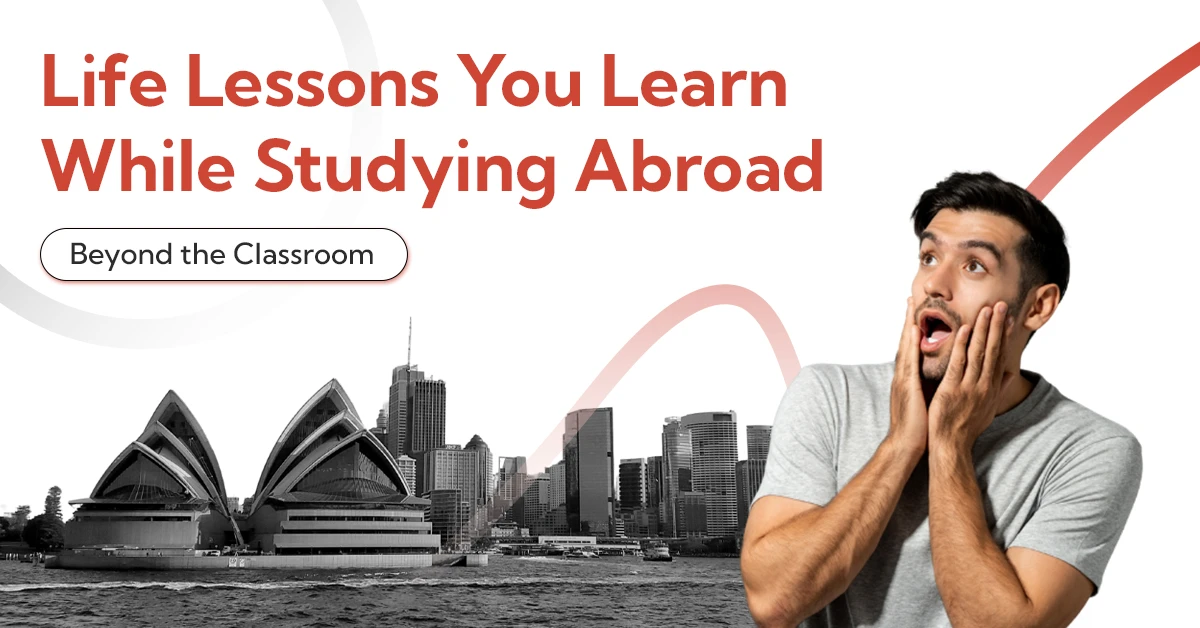It often starts with a suitcase, too small to carry everything you feel. There’s the weight of home, folded into every piece of clothing you pack. There’s nervous excitement tucked between documents and flight tickets. No matter how many times you imagined it, nothing prepares you for that moment when the airplane lifts off and your world shifts — slowly, yet suddenly.
Studying abroad seems, at first, like a decision based on degrees, rankings, and opportunities. You go for the classes, for the campus life, for the better future that everyone talks about. But what you really learn happens between the lectures and the lonely dinners, in train stations where signs don’t speak your language, and in the quiet moments you sit with yourself.
These lessons don’t appear in any curriculum. They’re not tested by exams. But they shape you in ways that no degree ever can. What follows isn’t just a story — it’s a collection of truths that come alive only when you leave everything familiar behind
Lesson #1: Independence Isn’t Optional – It’s Survival
In your home country, independence feels like a choice. You step in and out of it. You manage things alone, but with a safety net below. Abroad, that net vanishes the moment you land. Suddenly, the day begins and ends with your decisions.
The smallest tasks become your training ground. You learn how to cook not by recipes but by trial and error the rice burns, the pasta sticks, but slowly, you get it right. The laundry machine once a mysterious machine in the corner of your house becomes a friend you visit weekly. You fill forms, book appointments, fix leaks, and keep receipts — not because you want to, but because you must.
It’s not glamorous. It’s not always fun. But every task you manage adds a thread to your growing strength. You stop looking for help before trying. You start trusting yourself. And one day, you look around, realize you’re not just surviving anymore you’re thriving.
Lesson #2: The Power of Perspective
Living in a new country doesn’t just show you different buildings or people — it shows you different ways of thinking. Suddenly, what you knew as ‘normal’ becomes one version among many. Holidays are celebrated differently. Words mean different things. People eat breakfast at times that once seemed absurd.
You may feel defensive at first. The way you grew up feels challenged. But if you pause, observe, and ask why a door opens. You learn that people aren’t strange. They’re just shaped by different stories.
And in those stories you find empathy. You stop judging by first impressions. You start listening to accents, not mocking them. You begin understanding that there’s no single way to live, to learn, or to belong.
Perspective does not mean forgetting where you come from. It means honoring your roots while respecting someone else’s. And that change in your lens — once made — never fades.
Lesson #3: Friendships in the Unlikeliest Places
When you first arrive you expect to make friends in class or orientation events. But the friendships that change you often begin elsewhere in shared glances during awkward bus rides, in the kindness of someone who helps when you drop groceries, in conversations started with little more than a smile.
You bond over homesickness. Over how expensive the local food is. Over missed trains and found shortcuts. Your backgrounds might not match. Your cultures may clash. But in the gap between your stories, you build something new — something real.
You stop searching for people like you and start embracing people who make you feel understood. You find that friendships don’t require identical pasts, only shared presence.
Years later, you may not remember every subject you studied. But you’ll remember how your friend from another continent brought you soup when you were sick. You’ll remember laughing at jokes that didn’t need translation. You’ll remember that being far from home didn’t mean being alone.
Lesson #4: Failure is a Part of Growth
There’s a day that humbles you — maybe it’s the day you fail an exam, miss a submission, or speak and aren’t understood. It’s the moment when the perfect image of your overseas journey cracks. That’s when you meet failure — up close, unavoidable, and personal.
But it doesn’t end you.
Instead, it teaches you. It shows you that being brave doesn’t mean never falling — it means rising after. You learn to forgive yourself. You learn to try again, not with pride but with patience.
Failure becomes your teacher. It reminds you that progress is not always straight. That growth is often hidden in discomfort. And that resilience is a skill, not a trait.
Soon, you stop fearing failure. You start welcoming it, because you know it leaves you stronger than it found you.
Lesson #5: Appreciation for the Small Things
It’s funny how distance sharpens gratitude. Back home, you overlooked the smell of your favorite food, the sound of your language in the background, the way your parents said “eat” even when you weren’t hungry.
Abroad, these become treasures. You miss the texture of your bed. The faces that didn’t need words to understand you. The casual ease of walking into a shop and knowing how everything works.
In return, you learn to notice what’s around you. A cup of coffee shared in silence. A local vendor who greets you in broken English. A sunset on a street you now call familiar. These things — once unremarkable — become gold.
Gratitude grows where comfort ends. And studying abroad teaches you not just to chase big dreams, but to cherish the little things along the way.
Lesson #6: You’re Capable of More Than You Think
There comes a moment when you stand in the middle of a crowded market, or in a room full of strangers, or alone in your apartment — and you realize something has changed. You’re no longer afraid of being alone. You’re not just coping — you’re creating.
You’ve learned to speak, even when your accent stumbles. You’ve dared to ask questions. You’ve made a life in a place where you once felt like a guest.
You begin to look back at the person you were when you boarded the plane — scared, excited, unsure. And you see now that person held more courage than they knew.
You realize you’re stronger than your fears, smarter than your doubts, and more adaptable than you imagined. You don’t need approval to prove your growth. You live it — in every meal you cook, every problem you solve, and every step you take into the unknown.
That knowledge doesn’t go away when you return home. It stays. It becomes a quiet certainty in your bones — a voice that says, “You did that. You can do more.”
Conclusion: More Than a Degree
In the end, you do earn a degree. But what you really walk away with is invisible — yet permanent.
You return with new habits, wider eyes, and a heart that beats to more than one rhythm. You learn that life isn’t about finding comfort — it’s about finding courage. That understanding doesn’t come from answers — it comes from curiosity. That growth doesn’t happen in leaps — it happens in small, steady steps, each one taken when no one is watching.
The journey abroad is not a break from real life. It is real life — concentrated, intense, and unforgettable.
No matter where you started, or where you go next, one thing becomes clear: you are no longer who you were. And that change — shaped by experiences beyond the classroom — is the greatest lesson of all.




